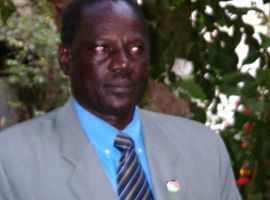S. Sudan says talks over size of regional force under way
March 16, 2014 (JUBA) – South Sudan’s cabinet on Friday approved the deployment of regional forces from the Intergovernmental Authority for Development (IGAD) member countries to help end three months of violence in the country.

The East African force will also attempt to protect South Sudan’s oil fields, mainly situated near the border with Sudan in Unity and Upper Nile states, which are considered rebel strongholds.
South Sudan’s minister of information, Michael Makuei Lueth said in a statement broadcast over the weekend by the state owned SSTV that cabinet had “unanimously” and unconditionally approved a communique of the IGAD member countries in its 25th ordinary session of heads of state on the country’s conflict.
On Thursday last week, a regional heads of states meeting in the Ethiopian capital, Addis Ababa authorised the prompt deployment of a Protection and Deterrent Force (PDF) from the region to help restore peace and stability in South Sudan.
Lueth said discussions over the size and mandate of the regional force were yet to be concluded.
The IGAD force, he added, would come from Burundi, Kenya, Djibouti, Ethiopia and Rwanda, who had expressed willingness to contribute the troops.
“The government has accepted this regional initiative and is ready to receive them. What remained not concluded are discussions about the size and mandate,” the minister told reporters in Juba Friday.
He stressed that support to these forces, the nature of which he did not specify, would come from the UN and African Union. The statement did not, however, mention the period of deployment and under whose command the forces would be deployed.
The lack of clarity over the proposed IGAD force has attracted criticisms from both the public and members of the ruling Sudan People’s Liberation Movement (SPLM).
A senior SPLM official told Sudan Tribune on Sunday that the government appears to be focusing on how to stay in power rather than what was best for the country.
“Look here and I think this is what the media should have asked for clarity purpose is the source of funds, specifically how much. Who is going to pay this force is not clear. We only hear about talks of unspecified support from the United Nations and the African,” said the official who preferred anonymity.
“There is nothing about the period of deployment. How long will this remain in the country is not clearly stated,” he added.
The official further pointed out the relationship between the government, national army and the forthcoming regional foreign force have not been clearly defined.
“Another important here is about precautions this force will take to minimise the loss of life and destruction of properties. This is very important because foreign forces are always ruthless. Other concerns should be given to whether this force will be for active combat or for preventive measures. Clarifications about the roles and duties must be clearly stated”, he explained.
LEAN AND HIGHLY PROFESSIONAL
A senior diplomat at the ministry of foreign affairs told Sudan Tribune on Sunday that the government was still gathering specific details about the size and mandate of the regional force, but that he expects the force to be “lean and highly professional”.
“I know discussions are continuing. They have not been concluded. The Ethiopian minister of foreign affairs and our minister of foreign affairs, honourable Dr. Barnaba Marial Benjamin have had repeated and constructive discussions about this before and on the sideline of the summit this week. Ethiopia and Kenya as well as Rwanda will be the lead contributing countries”, he said.
Around 10,000 people are estimated to have been killed and hundreds of thousands displaced as a result of the conflict since it began in December 2015, pitting the government against rebels – the SPLM/A in Opposition – which is being led by former vice president Riek Machar.
Uganda, which deployed troops to South Sudan to support the government and in some cases fight rebels alongside the SPLM/A, vowed to pull its troops out of the new nation country once IGAD puts in place the regional stabilisation force.
Already the ongoing peace talks in the Ethiopian capital have stalled with rebels led by Machar openly rejecting IGAD’s proposal.
(ST)
